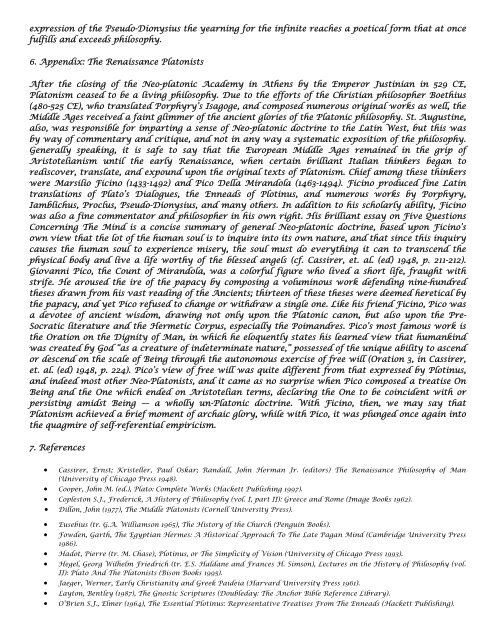Neo-Platonism - Grand Lodge Bet-El
Neo-Platonism - Grand Lodge Bet-El
Neo-Platonism - Grand Lodge Bet-El
You also want an ePaper? Increase the reach of your titles
YUMPU automatically turns print PDFs into web optimized ePapers that Google loves.
expression of the Pseudo-Dionysius the yearning for the infinite reaches a poetical form that at once<br />
fulfills and exceeds philosophy.<br />
6. Appendix: The Renaissance Platonists<br />
After the closing of the <strong>Neo</strong>-platonic Academy in Athens by the Emperor Justinian in 529 CE,<br />
<strong>Platonism</strong> ceased to be a living philosophy. Due to the efforts of the Christian philosopher Boethius<br />
(480-525 CE), who translated Porphyry’s Isagoge, and composed numerous original works as well, the<br />
Middle Ages received a faint glimmer of the ancient glories of the Platonic philosophy. St. Augustine,<br />
also, was responsible for imparting a sense of <strong>Neo</strong>-platonic doctrine to the Latin West, but this was<br />
by way of commentary and critique, and not in any way a systematic exposition of the philosophy.<br />
Generally speaking, it is safe to say that the European Middle Ages remained in the grip of<br />
Aristotelianism until the early Renaissance, when certain brilliant Italian thinkers began to<br />
rediscover, translate, and expound upon the original texts of <strong>Platonism</strong>. Chief among these thinkers<br />
were Marsilio Ficino (1433-1492) and Pico Della Mirandola (1463-1494). Ficino produced fine Latin<br />
translations of Plato’s Dialogues, the Enneads of Plotinus, and numerous works by Porphyry,<br />
Iamblichus, Proclus, Pseudo-Dionysius, and many others. In addition to his scholarly ability, Ficino<br />
was also a fine commentator and philosopher in his own right. His brilliant essay on Five Questions<br />
Concerning The Mind is a concise summary of general <strong>Neo</strong>-platonic doctrine, based upon Ficino’s<br />
own view that the lot of the human soul is to inquire into its own nature, and that since this inquiry<br />
causes the human soul to experience misery, the soul must do everything it can to transcend the<br />
physical body and live a life worthy of the blessed angels (cf. Cassirer, et. al. (ed) 1948, p. 211-212).<br />
Giovanni Pico, the Count of Mirandola, was a colorful figure who lived a short life, fraught with<br />
strife. He aroused the ire of the papacy by composing a voluminous work defending nine-hundred<br />
theses drawn from his vast reading of the Ancients; thirteen of these theses were deemed heretical by<br />
the papacy, and yet Pico refused to change or withdraw a single one. Like his friend Ficino, Pico was<br />
a devotee of ancient wisdom, drawing not only upon the Platonic canon, but also upon the Pre-<br />
Socratic literature and the Hermetic Corpus, especially the Poimandres. Pico’s most famous work is<br />
the Oration on the Dignity of Man, in which he eloquently states his learned view that humankind<br />
was created by God “as a creature of indeterminate nature,” possessed of the unique ability to ascend<br />
or descend on the scale of Being through the autonomous exercise of free will (Oration 3, in Cassirer,<br />
et. al. (ed) 1948, p. 224). Pico’s view of free will was quite different from that expressed by Plotinus,<br />
and indeed most other <strong>Neo</strong>-Platonists, and it came as no surprise when Pico composed a treatise On<br />
Being and the One which ended on Aristotelian terms, declaring the One to be coincident with or<br />
persisting amidst Being — a wholly un-Platonic doctrine. With Ficino, then, we may say that<br />
<strong>Platonism</strong> achieved a brief moment of archaic glory, while with Pico, it was plunged once again into<br />
the quagmire of self-referential empiricism.<br />
7. References<br />
• Cassirer, Ernst; Kristeller, Paul Oskar; Randall, John Herman Jr. (editors) The Renaissance Philosophy of Man<br />
(University of Chicago Press 1948).<br />
• Cooper, John M. (ed.), Plato: Complete Works (Hackett Publishing 1997).<br />
• Copleston S.J., Frederick, A History of Philosophy (vol. I, part II): Greece and Rome (Image Books 1962).<br />
• Dillon, John (1977), The Middle Platonists (Cornell University Press).<br />
• Eusebius (tr. G.A. Williamson 1965), The History of the Church (Penguin Books).<br />
• Fowden, Garth, The Egyptian Hermes: A Historical Approach To The Late Pagan Mind (Cambridge University Press<br />
1986).<br />
• Hadot, Pierre (tr. M. Chase), Plotinus, or The Simplicity of Vision (University of Chicago Press 1993).<br />
• Hegel, Georg Wilhelm Friedrich (tr. E.S. Haldane and Frances H. Simson), Lectures on the History of Philosophy (vol.<br />
II): Plato And The Platonists (Bison Books 1995).<br />
• Jaeger, Werner, Early Christianity and Greek Paideia (Harvard University Press 1961).<br />
• Layton, Bentley (1987), The Gnostic Scriptures (Doubleday: The Anchor Bible Reference Library).<br />
• O’Brien S.J., <strong>El</strong>mer (1964), The Essential Plotinus: Representative Treatises From The Enneads (Hackett Publishing).
















